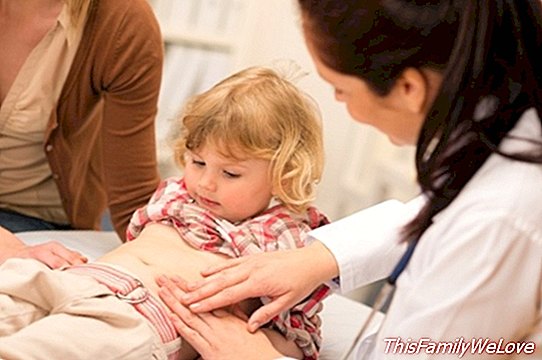How to control gastroenteritis in children and babies

Gastroenteritis is a disease that, in the vast majority of cases, is due to a viral cause and usually lasts only a few days. But during the process to control gastroenteritis in children and babies it is important to prevent the spread of other members of the household and prevent the sick child or baby from becoming dehydrated due to vomiting or intense diarrhea.
How to prevent the spread of gastroenteritis
Washing the child's hands and their caregiver is the cheapest and most effective way to prevent it.
When do we have to wash our hands ?:
- Before setting the table
- Before eating
- Before preparing or touching any food or kitchen utensil
- After going to the bathroom, cleaning children or handling diapers
- Fundamental after sneezing, coughing and blowing
- After being with a sick person or playing with a pet.
It is advisable not to share kitchen utensils, towels, napkins or anything that has been in contact with the mouth of the sick child.
Vomiting in children and babies, what to do if vomiting does not stop?
When vomiting begins, the first questions for parents about what to offer the child and when to do so may occur:
- Just after expelling food from the stomach, wait a bit before offering some drink to give time for the stomach to settle.
- It is advisable to offer a drink containing minerals to recover lost nutrients (for example, serum).
- During the first hour, we should give the liquid little by little, (a teaspoon of whey or isotonic drink every five minutes)
- Avoid the child drinking large amounts because if the stomach is resentful, may vomit again.
In case of babies:
- With complementary feeding, we should offer them serum often during the first 24 hours or until the vomiting stops and, if you are hungry, feed him as many times as he wants and as much as he wants. It is not advisable to vary the feeding. The child can continue to take cereals, vegetables, meat, fish, dairy products (milk and yogurt) and regular fruits.
- In lactating babies, it is not necessary to vary their diet. The mother should continue breastfeeding with breast milk as well. The same for babies who take a bottle.
How to control diarrhea in children
Diarrhea is one of the symptoms that occur most rapidly when contagion occurs.
- Although the episodes of liquid stools are repeated every time the baby or child eats, it is necessary to continue offering it without forcing, since the body will always absorb some nutrient.
- If the diarrhea lasts more than 2 or 3 days, it is necessary to go to the doctor to make an evaluation of the child.
Guidelines for controlling dehydration
The most important in these cases is to control that the baby or child is not dehydrated and in case of doubt, always go to the doctor or pediatric emergency.
- Check that the mouth and the area of the tongue is moist and with plenty of saliva.
- Control that I cry with tears. Absence is a symptom of dehydration.
- Controls the absence or absence of fever.
- Check that the fontanelle is not sunken.
Dr. Paloma Nacher. Neonatal Service of La Milagrosa Hospital
It may interest you:
- Tricks to treat vomiting in children




